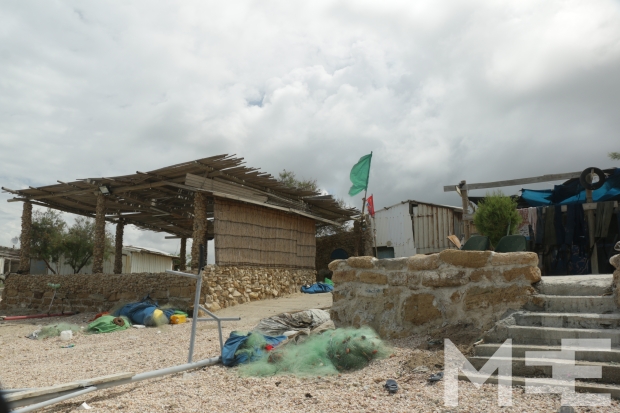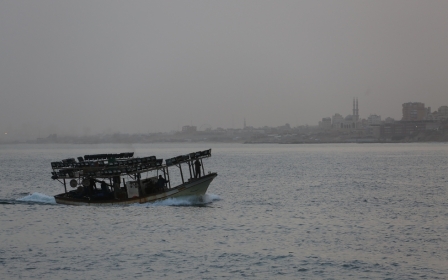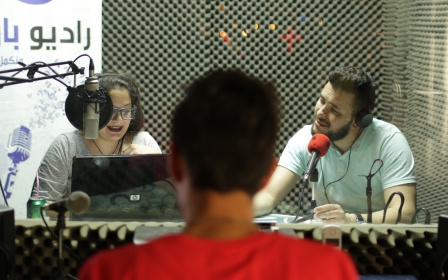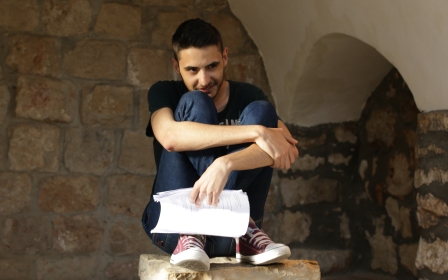In Israel’s poorest town, Palestinian fishermen forced to give up livelihoods
JISR AL-ZARQA, Israel - Fishing has been in 44-year-old Musa Jurban’s family for at least three generations.
“My father was a fisherman and my grandfather was also a fisherman,” Jurban told Middle East Eye. “It was passed down from grandfather to father to son.
“But if my children said they wanted to be fishermen, I wouldn’t want that,” he said.
Because of the state’s restrictions on small-scale fishing in his village, Jisr al-Zarqa, Jurban won’t be teaching his children to fish.
“You can't depend on fishing to make a living. Me, as a 44-year-old, I can’t give it up. I’m going to be going out into the sea for the rest of my life,” he said. “But I want my children to learn something else.”
Fishing has historically been a pillar of Jisr al-Zarqa’s economy. While it is regularly referred to as a “fishing village” in Israeli media, only about 20 local families remain that depend on fishing for a livelihood, down from 200 or so in the 1990s.
Jisr is the only coastal Palestinian village that remained in Israeli territory after most Palestinians were displaced amid the violence of the state’s creation in 1948. The town is also Israel’s poorest village, with its residents earning the lowest wages in the country, according to data from the Central Bureau of Statistics. Some 80 percent of its people live below the poverty line, including many fishermen.
“With these small, simple, traditional boats, fishermen can’t get the quantity of fish they need” to make a living, said Sami al-Ali, a member of Jisr’s village council and spokesman for the Joint List, a political faction in Israel made up mostly of Palestinians.
“Today there are only about 20 fishermen families left, it seems, because of the taxes, because of the restrictions, and also there aren’t that many fish in this area anymore.”
Facing a fish scarcity, rising permit costs, increased taxes, limitations on the number of miles small boats can legally venture into the sea, as well as a recent state mandate shortening the fishing season, many of the village’s fishermen have abandoned the trade of their forefathers to work as unskilled labourors in nearby Jewish cities.
According to the village council, the scarcity is caused by large Israeli commercial fishing vessels from outside the village that fish all year round without being bothered by the state, even during the spawning season.
Since police never stop and inspect them the way they often do Palestinian fishermen, the commercial fishermen can get away with using banned drift nets, which cause ecological damage, Ali told MEE.
Pollution from nearby factories and a neighbouring power plant has also contributed to the fish scarcity, he added.
‘If I don’t fish, I don’t feed my children’
For Jurban, the state restrictions on fishermen almost feel like the government is banning him from doing the only job he knows.
“Fishing is difficult; the government is always enacting laws that make it difficult,” he told MEE.
“I don’t agree with those laws. If I don’t go into the sea to fish, I don’t feed my children.”
In an effort to improve the livelihood of Palestinian fishermen in Jisr and other areas in Israel, a group of Palestinian leaders recently met with fishermen in the nearby town of Fureidis, local media reports said.
Ali attended the meeting along with Osama Saadi, a member of the Israeli Knesset representing the Joint List.
The meeting addressed two new state restrictions: a ban on coastal fishing during the April-May spawning season and a rule requiring fishermen to prove they have filed tax returns before being issued fishing permits.
Attendees said they believe the laws were designed to force Palestinian fishermen to abandon the profession.
The fishermen demanded that the Israeli agriculture ministry rescind the restrictions and suggested the April-May ban be enforced only for big commercial fishing vessels rather than for small-scale fishermen.
If the ban does stay in place, they asked that the government at least provide them with compensation for the money they would have made in those two months of fishing.
“In order for me to agree with those laws, I’d need a monthly allowance,” Jurban told MEE.
“I usually make approximately 2,000-2,500 shekels a month fishing [$520-$650], so if I can’t go into the sea to fish they need to give me that much so that my life can continue.”
In order to supplement his income, Jurban has opened a small restaurant on the beach, where he serves freshly caught fish to tourists who all too rarely pass through Jisr al-Zarqa.
Unfortunately for Jubran, tourists are much more likely to visit neighbouring Caesarea, one of the wealthiest cities in Israel, where Prime Minister Benjamin Netanyahu owns a villa.
'Ghettoisation and siege'
Caesarea sits directly south of impoverished Jisr al-Zarqa, on the other side of an earthen embankment erected in 2002 to divide the two communities.
Ali says the embankment is another example of official Israeli discrimination against its Palestinian citizens, on top of the restrictions on fishermen.
“We struggled to protest against this wall,” Ali said. “But in the end they built it.”
The embankment is 1,500 metres long, five metres wide, and between eight and 10 metres tall.
“Here in the heart of Israel, in the centre of the country, we see apartheid manifested between an Arab village and a Jewish city,” Ali told MEE.
The official reason Caesarea residents gave for wanting the wall to be built was in order to block the sound of the call to prayer from Jisr al-Zarqa’s mosques, in addition to preventing thieves from crossing into the city to rob houses.
“But these arguments are invalid because the wall can’t stop these things,” Ali said, after easily scaling the embankment on foot.
“Their real goal is to keep us out of their community,” he said.
The embankment is just one of a series of Israeli barriers used to separate Palestinians from Jews, Ali said, comparing it to the infamous West Bank separation wall in addition to lesser-known walls in central Israel built between Jewish and Palestinian neighbourhoods.
“All these walls are built for racist reasons,” he said. “They’re built to divide and discriminate.”
In the case of Jisr al-Zarqa, the earth embankment completes what Ali calls a geographical siege around the town - the wall to the south, the sea to the west, a state park to the north, and the main highway to the east.
Besides an inconvenient road built mainly for the state park, the only entrance to Jisr al-Zarqa is through a small tunnel underneath Highway 2, which connects Tel Aviv and Haifa. There is no exit from that main highway for Jisr al-Zarqa, although there is one for next-door Caesarea. To access Jisr, cars must take the interchange from Highway 2 to Highway 4, where they can exit onto a small road that leads to the village.
Since there are no roads directly connecting the side-by-side communities, Jisr residents who work in Caesarea must take a round-about route that can take upwards of a half-hour with traffic.
According to Ali, the isolation of Jisr al-Zarqa is an intentional tactic used by the state to keep the Palestinian community from expanding.
Israel is “practicing and pursuing the politics of ghettoisation and siege” in the town, he said.
As far back as 2008, the Israeli human rights group Adalah petitioned the Israeli government to connect Jisr to Highway 2, but to no avail.
"Not connecting Jisr al-Zarqa to the main coastal highway cuts its residents off from the main transportation routes in the country and hinders access to the main population centers as well as basic services such as health, educational, fire and emergency services," the group said at the time.
"In addition, it limits the employment opportunities available for the residents of the village, which has a limited internal infrastructure and few workplaces."
For Jurban, venturing into the vastness of the sea every day to fish is his only way to escape the hopelessness of his enclosed, impoverished village. But as the state continues to pile on restrictions, he feels he is losing even that freedom.
“When they basically ban me from fishing, I can’t accept that,” he told MEE.
“No matter if they hit me in the head or shoot me, I’m going to keep going into the sea to fish.”
New MEE newsletter: Jerusalem Dispatch
Sign up to get the latest insights and analysis on Israel-Palestine, alongside Turkey Unpacked and other MEE newsletters
Middle East Eye delivers independent and unrivalled coverage and analysis of the Middle East, North Africa and beyond. To learn more about republishing this content and the associated fees, please fill out this form. More about MEE can be found here.










